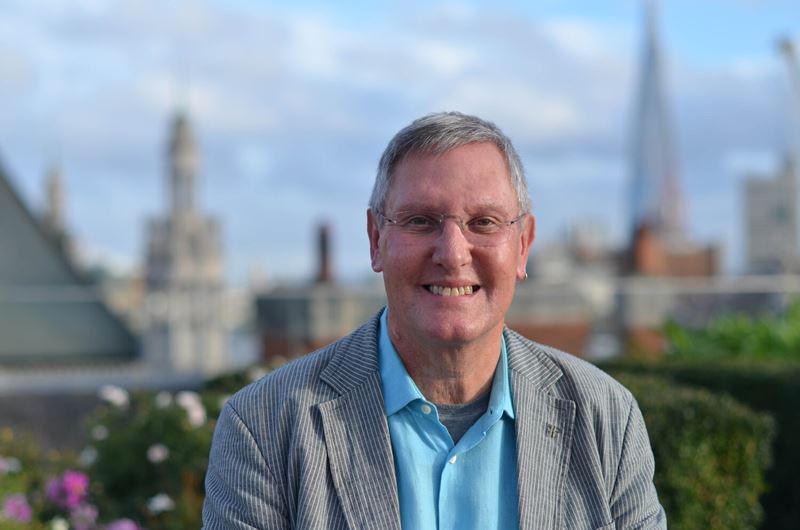Abi: Can you tell us about your journey to becoming a writer?
Robert: I've written since I was a teenager, and have always loved the process. I thought I was going to write The Great British Novel, but after writing short stories I got waylaid into poetry in 1982 when my first poem (about my grandmother moving into a care home) was published in Ambit magazine. After I won a Northamptonshire Poet of the Year competition around 1985 (judged by Liz Lochhead, a poet I greatly admire) poetry took me over. I've also been writing a journal on and off since I was about fifteen, so I think using words to understand my experience has stayed with me. I should say that support from fellow writers has been very important to my development. When I lived in Leicestershire I was lucky enough to meet the poets Catherine Byron and Mahendra Solanki. They became incredibly supportive mentors to me, and I joined a poetry workshop with them, which taught me so much about poetry. Their support eventually led to the publication of my first poetry collection Warpaint Angel in 1997, published by Blackwater Press, who were based in Leicester.
Abi: What is the greatest achievement in your career so far?
Robert: I think my greatest achievement feels to be the publication of six poetry pamphlets, four poetry collections and a memoir with poems during twenty-six years of publishing. I'm not sure if I have a 'career' as such, but having those publications making their way in the world feels like an achievement against the odds. I come from a council estate in Whitechapel, and although working-class and queer writers are finally seeing their books published in greater numbers, I feel we are still under-represented within publishing. It feels like a predominantly white middle-class heteronormative publishing environment where we pitch our voices to be heard, as if working-class and queer writers are expected to tell one-note stories about our identities. Fortunately we are showing that we have thousands, even millions of stories to tell, in as many forms and voices as we choose. I feel proud to be making my contribution within that more radical tradition.
Abi: What words of wisdom can you impart to aspiring writers?
Robert: Persevere, despite inevitable knock-backs. Find your voice through hard work, drafting and redrafting and continuing to write. Challenge and extend your voice, and don't get overwhelmed by how others with more power or influence might want to 'market' or limit your vision. In her poem 'A Litany for Survival' Audre Lorde says 'So it is better to speak/remembering/we were never meant to survive.' I'd also advise please make a distinction between writing and publishing. They take different energies and focus, and although I think it's important to find readers through publishing, it's not the only path. Devotion to the process of writing - honing and developing your craft - is the key. As part of this process, try to find a good writers' workshop of your peers if possible, where you can test out your work in a positive and constructively critical community. It'll help you learn from others - the different ways they're working - while hearing advice about how your writing comes across. Hopefully, it'll also help you to feel less isolated when you write.
Abi: What are you reading right now?
Robert: I've got three books on the go at the moment (something I wouldn't necessarily advise). The first is The Messenger House by Janet Sutherland, published earlier this year. It's a marvellous, complex and moving hybrid book of prose and poetry about retracing her great-great-grandfather's 1840s travels in Serbia. I love the ways Janet Sutherland plays with form, and her quietly enquiring, lyrical voice. Then I'm halfway through volume three of The Diary of Virginia Woolf 1925-30. She can be incredibly snobbish, and even racist (which is shocking to read) but she writes wonderfully about the writing process, so in these diaries we see her getting the ideas for and drafting To The Lighthouse, Orlando, The Waves and A Room of One's Own. Lastly, I'm taking very slowly an excellent academic book Katherine Mansfield and the Origins of Modernist Fiction by Sydney Janet Kaplan. I'm a fan of Mansfield's stories, letters and journal, so it's affirming to read a book that takes her work and influence seriously.
Abi: Who is your favourite poet?
Robert: It's a toss up between John Clare and Adrienne Rich, so I'd have to pick both, as they give me different things. I write about Clare's work and example as a working-class poet in my memoir A Length of Road. His ability to focus respectfully on nature is remarkable, and I continue to learn a great deal from his poetry and prose, particularly his marvellous sonnets. Adrienne Rich teaches me with her poems and essays; her focus on feminism helps to keep me aware, and she has such acute insights, personal authority, self-challenge and glorious phrase-making. I often return to both of these poets, along with my own personal canon, the past and the contemporary poets who mean most to me.
Robert Hamberger will headline WORD! on Thursday 28th September, 2023, reading alongside Teagan Buckley. Sign-up to workshop with Robert or perform on the open mic via [email protected] -
and/or book tickets HERE


